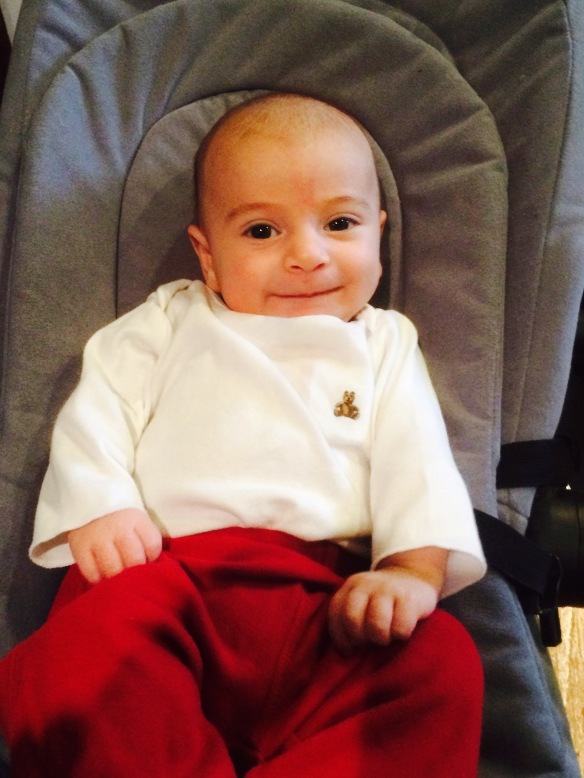Turns out that revising a book for publication and working on a novel while raising three kids is not conducive to keeping up my blog. I have a lot of catching up to do. A topic I’ve been wrestling with lately is that of conflict. General conflict (Barcelona attacks have just taken place, the Syrian conflict continues to rage—not to mention the ongoing war in the Central African Republic) but also conflict as it plays out in places that are supposedly safe, particularly in public spaces. Also, what it means to be a bystander, my belief that we should almost always get involved, and how karate training ties into these issues.
***
Two years ago, when my third child had just been born, a house was going up across the street from mine. The work was taking place a few feet from the neighbour’s lot, where we rent a parking spot. The space is narrow, requiring some adept manoeuvring to park the car. One afternoon, I was chatting with the owner of the property, when I noticed that some building equipment had been left in my spot.
The owner of the house is a Portuguese woman in her seventies. She’s slight, stooped, and wears thick-lensed glasses. I asked her if she’d given the builders permission to store gear on her property.
She replied in the negative so, seeing one of the workers working on the new build, I called out to him and asked if he could move the equipment.
He was about five foot eight and broad shouldered. His hair was long and he had a few days worth of stubble on his chin. His eyes were red and he swayed on his feet. He was either intoxicated or coming off something—either way, he was in a very bad mood.
“Talk to the owner if you have a problem,” he said.
“He’s not here,” I said. “I’m going to hit your stuff on my way out. Do you mind if I move it?”
“Don’t you touch it.”
“You know this is this woman’s property, right?”
“It’s public parking.”
“No, it’s not. Can I have the owner’s contact information?”
“No.”
“How can I talk to the owner if you won’t give me their phone number?”
“It’s not my problem.”
“I’m going to have to move some of it.” I walked toward a metal cart.
“Don’t you dare!” He came around the fence that divided the building lot and the neighbour’s lot on which the owner and I stood. He grabbed the cart and put it back where it had been, a few inches from my car.
Recently, when I told my eight-year-old that I have a bad temper, he looked at me like he’d never seen me before. Twenty years of meditation and karate have helped me control my quick-temperedness, but I’m not always on top of things. Karate teaches us to diffuse situations, not exacerbate them. I could have let the issue go—after all, I could have tried to manoeuvre my car around the building equipment. But I was annoyed, and so I didn’t. Instead, I engaged the guy. It wasn’t my finest moment.
I took a hold of the cart and pulled. Again, the man grabbed it and rolled it back to its original spot.
He parked himself in front of me. I smelled the loamy scent of the mud on his work boots. “I’m calling the police,” he said.
I’m five foot two and a half, and, even post-partum, I only weighed about one hundred and twenty pounds. My eyes were level with his neck. I had to tilt my head up to look him the eye. “Perfect,” I said. “Call them.”
He made as if to reach for something in his jacket pocket, and his hand was trembling. “F**K you,” he said, coming so close that his jacket brushed mine. “I’m not here to give you an orgasm.”
Because these are the kinds of things men say to women when they’re angry at them.
At this point in our encounter, neighbours who had been drawn out of their houses by our raised voices came a little closer to watch the action.
I learned two things that afternoon. One, you can’t count on anyone to protect you on the street. Two male neighbours stood by and watched as a man verbally abused me, and did nothing.
Two, my karate training stood me in good stead. My first sensei always said, “when you find yourself facing an attacker on the street, you won’t be afraid. You’re used to facing attackers in sparring!”
Opposite the guy, I prepared to defend myself. I assessed a few of my target hotspots. The man’s nose—exposed like an enormous button of the kind toddlers love to push—seemed to me to be the most obvious target. His abdomen, partly shielded by a heavy canvas jacket, wouldn’t be ideal. His shins looked promising.
I wasn’t afraid. I really wasn’t. I was angry. I think he sensed this, because he yelled out a few more insults—as amiable as his last ones—and walked away.
It was only later that I became afraid. My husband was out of town. I was alone at home with a newborn, and the man knew where I lived.
I also felt that sense of shame that is specific to being on the receiving end of sexual verbal abuse. Welcome to being a woman (or anyone not gendered male, realistically) in the public sphere.
Later on, I managed to contact the owner of the new build. The construction company CEO came to our door and apologized. The construction worker who had threatened me disappeared from the work site. The home owner, a wide and no-nonsense Albertan, came to my door bearing a basket of blueberry tea and Saskatoon berry jam. “I’m really sorry you had to deal with that,” he said.
So that, friends, is what karate gets you. A lack of fear in a difficult situation, apologies, and delectable jam.

